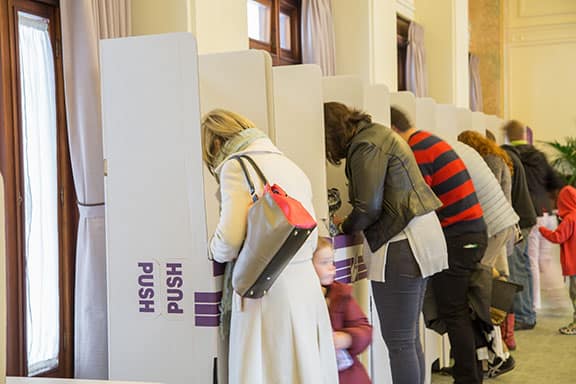
Travis Lavenski is a student at Harvard Law School.
In today’s news & commentary, strippers in Los Angeles will need to wait to determine if they have won their union election; the NLRB issues complaint against Verizon for terminating a worker engaged in union activity; and workers’ rights are on the ballot this Election Day.
Strippers in North Hollywood, California will have to wait a little longer to know if they won their union election, Bloomberg reported Monday. As I reported for OnLabor earlier this year, strippers at the Star Garden Topless Dive Bar have been attempting to organize after the worker’s concerns over safety conditions fell on deaf ears. After the employer refused to voluntarily recognize the union, the workers petitioned the NLRB for a union election; the Board scheduled the election to take place yesterday, November 7. The election results were inconclusive, however, as all but one of the worker’s ballots was challenged. The employer argues that the challenged votes were cast by independent contractors, making them ineligible. Although the official election results will not be determined until the Board resolves the issue, workers at the club are reportedly celebrating as they believe they have the votes to form the union.
The NLRB issued a complaint against Verizon Wireless yesterday, alleging the April 2022 termination of Jesse Mason was motivated by anti-union animus. Mason, who was reportedly inspired by labor victories at Starbucks, was the main person attempting to organize his Verizon store in Seattle. Mason, who had no disciplinary record while working at Verizon, was suddenly subjected to increased scrutiny after other stores in the Seattle area announced their intent to organize. Then, on the first work day after Mason was photographed celebrating the union victory of the other Verizon stores, he was terminated by the company. The Board is seeking to reinstate Mason with backpay. The hearing is scheduled for February 14, 2023.
Finally, Election Day is here, and workers’ rights are on the ballot. Two states along with Washington, D.C., will be voting whether to increase the minimum wage for their workers. In Nevada, voters will decide on whether to increase the minimum wage to $12/hour by 2024, with annual inflation adjustments. In Nebraska, voters decide whether to increase their minimum wage to $15/hour by 2026 with inflation adjustments. And in our nation’s capital, voters will decide whether to raise tipped worker’s baseline hourly pay from $5.35/hour to $16.10/hour by 2027. Moreover, two states will be voting on questions with major implications for organized labor. In Illinois, voters will decide whether to approve of a state Constitutional Amendment to grant a “fundamental right to organize and bargain collectively” and to prohibit the passing of any law that “interferes with, negates, or diminishes” this right. This amendment would effectively protect workers against future attempts to pass anti-worker legislation. In Tennessee, however, voters will decide whether to enshrine right-to-work language in its state Constitutional Amendment. Moreover, the stakes are high for the federal Congressional races today, as a Republican takeover of one or both chambers would all but surely lead to an attempt to introduce an influx of anti-worker legislation.






Daily News & Commentary
Start your day with our roundup of the latest labor developments. See all
February 15
The Office of Personnel Management directs federal agencies to terminate their collective bargaining agreements, and Indian farmworkers engage in a one-day strike to protest a trade deal with the United States.
February 13
Sex workers in Nevada fight to become the nation’s first to unionize; industry groups push NLRB to establish a more business-friendly test for independent contractor status; and UFCW launches an anti-AI price setting in grocery store campaign.
February 12
Teamsters sue UPS over buyout program; flight attendants and pilots call for leadership change at American Airlines; and Argentina considers major labor reforms despite forceful opposition.
February 11
Hollywood begins negotiations for a new labor agreement with writers and actors; the EEOC launches an investigation into Nike’s DEI programs and potential discrimination against white workers; and Mayor Mamdani circulates a memo regarding the city’s Economic Development Corporation.
February 10
San Francisco teachers walk out; NLRB reverses course on SpaceX; NYC nurses secure tentative agreements.
February 9
FTC argues DEI is anticompetitive collusion, Supreme Court may decide scope of exception to forced arbitration, NJ pauses ABC test rule.